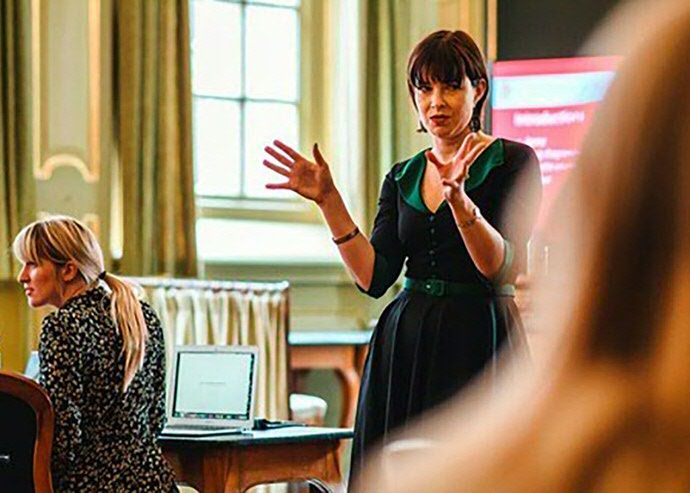Teaching Innovations: How podcasts help engage students

Dr. Erin Wilson, Dr. Tina Otten, Linde Draaisma and Henk van Putten are the winners of the first Best Practice in Teaching and Learning Award, the successor of the Teacher of the Year election. They won the prize for the innovative teaching methods they developed for their course The End of the World as We Know It? Climate Change, End Times and Sustainable Futures. Erin Wilson tells us about these methods and their prize winning course.
Which innovative teaching methods did you use in your course?
We used a podcast with two episodes per week, interviewing researchers from different disciplines and faculties from both inside and outside the university.
How did these methods come about?
This is a relatively new course. We taught it for the first time in 2020, and because of the pandemic it had to be entirely online. We noticed that while students seemed to be enthusiastic about the course and were submitting all their assignments on time, only about a third of those enrolled would show up for live online classes. We later heard that students would often listen to the recorded lectures later on, while they were cooking or doing their laundry. It meant they didn’t have to spend the entire day in front of screens. So we thought if that is how they like to engage with the lecture content, why not build on that and provide it in an engaging format.
What did these podcasts add to the course?
The main content was delivered in a much more engaging way. Instead of listening to a lecture from one person, students listened to a conversation, with someone asking the kinds of questions from an expert that they themselves would often like to ask. It also meant that we found a way to deliver content to all students, without them being altogether in the one room (which we could not do because of COVID restrictions) or requiring them to be in front of a screen.
How was the course received by the students?
We were really quite overwhelmed and humbled by the student response. I have had students approach me when I’m buying coffee to tell me how much the course impacted them. Last year’s cohort gave the teaching staff a letter of thanks and a box of vegan chocolates each. We’ve had messages from students since winning the award telling us that it was their favourite bachelor course. We had hoped to create something unique and special, to give students space to explore their worries and anxieties around climate change, but also provide the tools for thinking through those and discovering ways to act to try to address their worries, and not just be overwhelmed by despair. The reaction from students tells me that we’re doing something right, though of course there are always more improvements that can be made.

How can this course help students in their career?
The course is highly interdisciplinary, with reading materials, podcast guests and students following the course from archaeology, anthropology, psychology, philosophy, political science, medicine, international business, and, of course, theology and religious studies, so students learn the value of different types of methods and theoretical approaches. Our assignments focus on communicating with different audiences (a policy paper and a research essay, plus an audio “pitch” of their policy paper, and in-class discussions). One of the key skills students learn, however, is intercultural communication and developing an appreciation for and the ability to see the world through multiple different perspectives, and understand them, even if they may not agree with them, as a way to build relationships and coalitions for action on climate change issues.
When looking at the title, the combination of End Times and sustainability might surprise people. What do these topics have to do with each other?
Well, a lot of discourses around climate change feature themes that relate to “the End of the World”, so we wanted to create a course that really dug into those narratives and explored where they came from. The course is designed to introduce students to different worldviews, philosophies and religions, how they think about the relationship between humanity and nature, how ideas about the destruction of humanity and nature feature in different understandings of the End of the World, and then how those views in turn shape different communities’ responses to climate change. This is the focus of the first part of the course. The second part of the course then explores specific challenges connected with climate change, like climate conflicts, climate displacement, loss of natural and cultural land and heritage, mental health and psycho-social challenges connected with climate anxiety and how the perspectives studied in part one of the course can help us to make sense of these issues and may also contribute to the development of practical responses.
Read more:
More news
-
15 September 2025
Successful visit to the UG by Rector of Institut Teknologi Bandung
